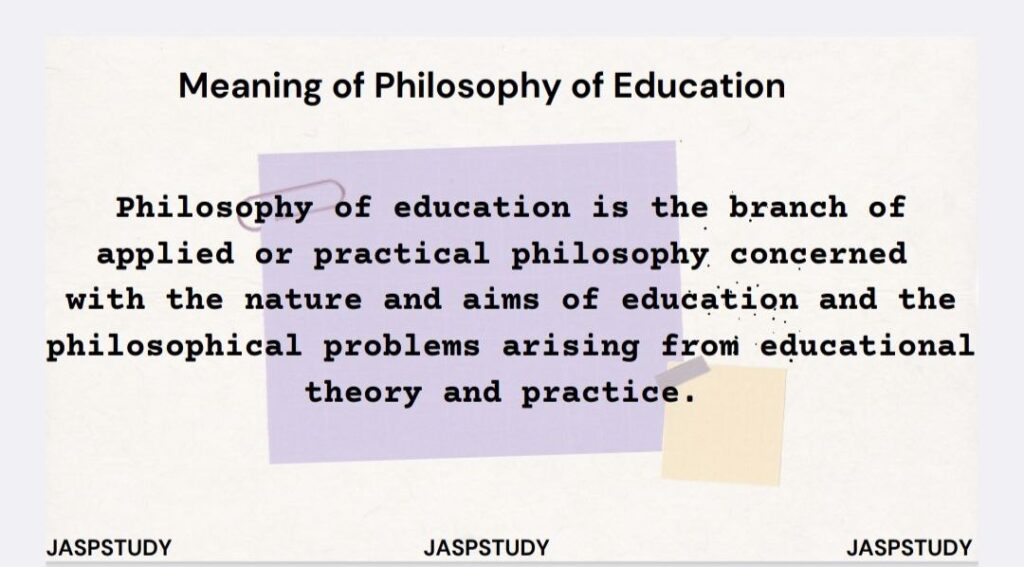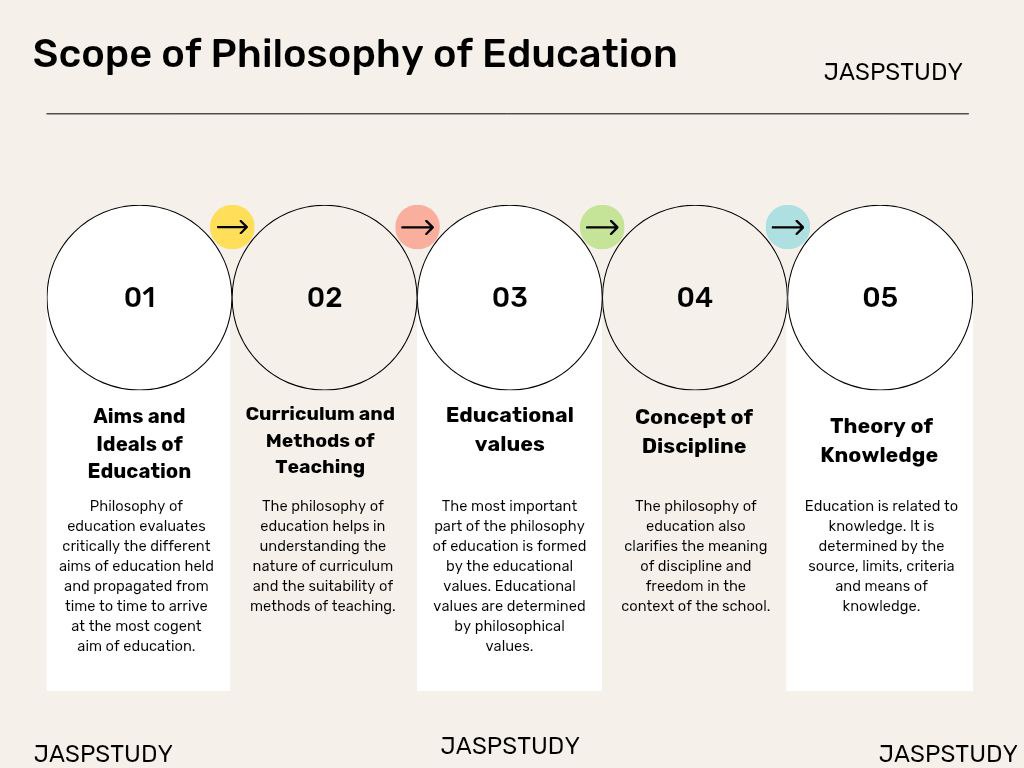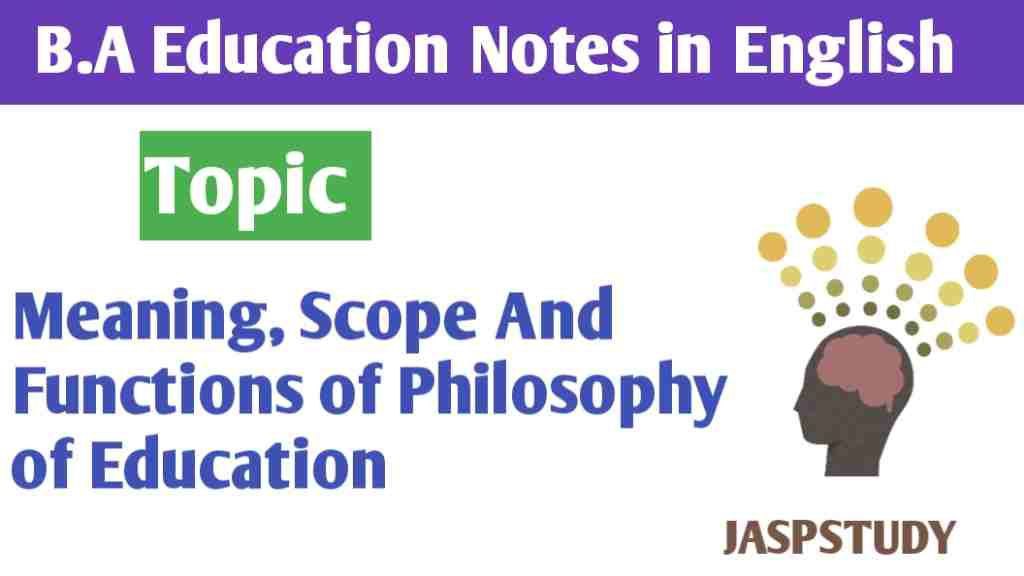In This Article we will discuss about Meaning Scope And Functions of Philosophy of Education.
Meaning of Philosophy of Education

Philosophy of education is the branch of applied or practical philosophy concerned with the nature and aims of education and the philosophical problems arising from educational theory and practice. It also examines the concepts and presupposition of education theories.
It is an inter-disciplinary field that draws inspiration from various disciplines both within and outside philosophy, like ethics, political philosophy, psychology and sociology. Many of its theories focus specifically on education in schools but it also encompasses others form of education. It’s theories are often divide into descriptive theories, which provide a value-neutral description of what education is, and normative theories, which investigates how education should be practiced.
Philosophers of education often approach educational issues from the vantage points of other philosophical sub-disciplines, and contribute in a variety of ways to the larger unfinished project of educational theory. These contributions may be divided into work on the nature and aims of education, on the normative dimensions of the methods and circumstances of education, and on the conceptual and methodological underpinnings of its methods and circumstances – either directly or through work on the foundations of other forms of research relied upon by education theory.
In brief, it is a philosophical process of solving educational problems through philosophical method, from a philosophical attitude to arrive at philosophical conclusions and results. Thus, it aims at achieving general as well as comprehensive results.
Scope Of Philosophy Of Education

The scope of Philosophy of Education confined to the field of education. These problems are general in nature, such as the interpretation of nature, the world and the universe, explanation of aims and ideals, the relationship of the various constituents of the field of education. The main problems of the philosophy of education includes aims and ideals of education, analysis of human nature, relationship of education and state, educational values, theory of knowledge and its relationship to education, economic system and education, the process of education and finally the relationship of education and social progress.
The above mentioned problems of philosophy of education constitutes its scope and clarify its nature. Thus, the scope of philosophy of education includes following:-
1.Aims and Ideals of Education
The aims of education falls under the scope of philosophy of education. Philosophy of education evaluates critically the different aims of education held and propagated from time to time to arrive at the most cogent aim of education. It must be noted here that philosophy is concerned with the general and universal aims rather than any specific and particular aim of education. It aims at presenting a synthesis of various aims and ideals of education.
2. Curriculum and Methods of Teaching
The philosophy of education helps in understanding the nature of curriculum and the suitability of methods of teaching. It also helps in understanding whether the curriculum should be flexible or rigid, whether it should be same for all the students.
3. Educational values
The most important part of the philosophy of education is formed by the educational values. Educational values are determined by philosophical values. Educational values held by different philosophers have been derived from their world view. Therefore, a scrutiny of the world views which is the specific function of the philosophy, is necessary for any treatment of philosophical values. The philosophical treatment of values not only evaluates but also systematises them in a hierarchy.
4. Concept of Discipline
The philosophy of education also clarifies the meaning of discipline and freedom in the context of the school and provides guidelines for discipling of the students taking into consideration the concept of human freedom in a democratically oriented society.
5. Theory of Knowledge
Education is related to knowledge. It is determined by the source, limits, criteria and means of knowledge. The discussion of all these falls within the jurisdiction of epistemology, one of the branches of philosophy, therefore, an important area of the functioning of philosophy of education is related to theory of knowledge.
6. Relationship of Education and various area of national life and various components of the system of education
One of the most important contribution of the philosophy of education to the cause of education is the provision of criteria for deciding the relationship of state and education, economic system and education, curriculum, school organisation and management, discipline etc. These problems have led to the evaluation of different philosophies of education. The criteria of judgment everywhere are determined by philosophy, therefore, philosophy of education provides the criteria for critical evaluation and judgment in these fields.
- Origin and Geographical Extent of Harappan civilization
- Main features of Mathura Style of kushana Sculptural Art
- Features of the Harappan civilisation
- Sailent features of the town planning of Harappan civilization
- Write a detailed note on Kayatha Culture and its salient features
- Write an essay on Jorwe Culture
- Main Features of Mauryan Art
- Discuss The Philosophy of History of Arnold Toynbee
- Date of coronaion of Kanishka1|Date of Accession of Kanishka 1
Function of Philosophy of Education
Philosophy of education performs various functions. These are discussed below:
A) Determining the aspects of education
Aims of education
Philosophy of education provides original ideas regarding all aspects of educationparticularly educational aims, method of teaching, curriculum, teacher, students etc. It is saidthat educational philosophy gives different views, but this situation is not harmful, rather it helpsin providing education according to the need of society.
The difference in view of philosophy ofeducation reflects the multiplicity and diversities of human life.(e.g- Self-expression is the aimof education under naturalism, where as it is self-realization in idealism and social efficiency inpragmatism) Philosophy of education guides the process of education by suggesting suitable aimsfrom the diversities of life and selecting the means accordingly.
Curriculum
With the help of educational philosophy, a teacher comes to know why naturalism givesemphasis to science subjects and why idealism gives importance to religious subjects. Thus ithelps curriculum designer to construct curriculum according to the need, ability and interest ofthe child.
Methods of teaching
Educational philosophy is very much helpful to adopt suitable methods of teaching andmake classroom teaching more effective and attractive. We get the knowledge of differentmethods of teaching, i.e. ‘Learning by doing’ in naturalism, ‘lecture method in idealism and experimental method in pragmatism. With the help of educational philosophy we able to choosethe suitable methods of teaching according to the nature of the subject and school environment.
Discipline
Concept of discipline changes with the changes in the outlook of life. In other word, disciplinereflects the philosophy of life. Idealism advocates street discipline and self control where asnaturalism emphasis freedom and natural discipline and pragmatism stressed social discipline. These disciplines are known from the study of different educational philosophies. Hence, theknowledge of educational philosophy is essential to follow a desirable discipline.
Teacher & Student
It is the educational philosophy which determines the role and quality of teacher as well asthe student in diversified society. With the help of educational philosophy, we get knowledgepertaining to the role of the teacher as well as student in the school and relationship with eachother. Students get secondary importance in idealism whereas they get primary importance innaturalism. Similarly there is a close relationship between the teacher and students in pragmatismand idealism whereas it is limited in naturalism.
Administration
The knowledge of what kind of school administration we should adopt is determined byeducational philosophy. Educational philosophy helps to establish a school in democratic ortotalitarian system. Now days we are following democratic principle for administering theeducational institution. This is based on educational philosophy.
B) Harmonizing old and new traditions in the field of education
In the process of social development the old traditions become outdated for the people. They are replaced by the new traditions. But this process of replacement is not always smooth.It is faced with lots of opposition from certain orthodox sections of the society.
At the same timeit must be kept in mind that every ‘old’ is not outdated and every ‘new’ is not perfect Therefore, there is a need of co-coordinating the two in order to maintain the harmony between both. Thisfunction can be performed by philosophy of education. (e.g., the crises of Indian culture Indianand Anglican, i.e. East and West) It tells us how the cultural tradition of the country is to bemaintained.
C) Providing the educational planners, administrators and educators with the progressive vision to achieve educational development
Spencer has rightly pointed that only a true philosopher can give a practical shape toeducation. Philosophy of education provides the educational planners, administrators and educatorswith the right vision which guides them to attain the educational goals efficiently. It is very muchuseful to educational practitioner for his work and its place in the general scheme of life.
Educational philosophy helps teacher, administrator or students to interpret his professionalexperiences with that of acquired theoretical knowledge and vice versa. The function of educational philosophy is to help the individual to fit the square peg in the square hole and round knot in theround hole. It helps him to grasp a conceptual framework on educational principles and practices. It further helps one to change or modify one’s activities to attained desired end or goal.
D) Preparing the young generation to face the challenges of the modern time
Society is not static; it changes its value, tradition, custom, culture etc. from time to time.Social commentators have given many labels to the present period of history for some it is theinformation age and for others it is post modernity, later modernity, high modernity or even theage of uncertainty. One more addition to this list may be that ‘present age is an age of Globalizationas a phenomenon arrived on the economic scene in the 1990 in India.
This watchword has had itsimplications in the social political, economic fabric of the country of which education is a part. Philosophy of education is a guiding, steering and liberating force that helps young people to andsociety at large to face the challenges of the modern time. It helps the individual to understandthe relationship between his goal and day to day routine work and develop critical attitude towardslife in diverse society.


Very good written information. It will be helpful to anybody who utilizes it, including myself. Keep doing what you are doing – for sure i will check out more posts.